German actor Götz George (1938-2016) was a popular film and theatre star for five decades. He gained international stardom on television in the Krimi TV series Tatort as the maverick police detective Horst Schimanski.

Promotion card for 'Pioneer, Die jeans mit der nummer'.
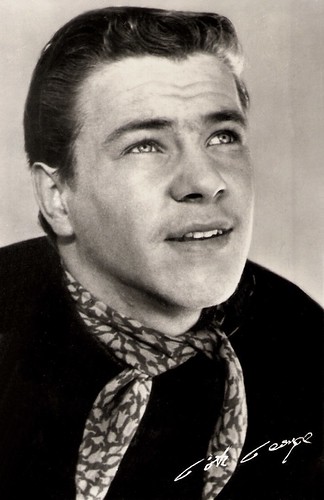
East-German postcard by VEB Progress Filmvertrieb, no. 23/6/3264, 1957. Retail price: 0,20 DM. Photo: DEFA / Wenzel. Publicity still for Alter Kahn und Junge Liebe/Old Barge, Young Love (Hans Heinrich, 1957).

German postcard by Rüdel Verlag, no. C 16. Photo: Rialto / Constantin / Vogelmann. Still for Der Schatz im Silbersee/The Treasure of Silver Lake (Harald Reinl, 1962).

German collectors card. Photo: Constantin / Rialto. Publicity still for Unter Geiern/Among Vultures (Alfred Vohrer, 1964).
Götz George was born as Götz Schulz into an actor family in Berlin in 1938. His father Heinrich George was a famous film and theatre star of his era. His mother Berta Drews was a well-known character actress. George was named after his father's favourite character, the Imperial knight Götz von Berlichingen, immortalised by Goethe. After the war, his father was imprisoned in the former Concentration Camp Sachsenhausen by the Soviets and died, exhausted and starving, in 1946, after a botched appendix operation at the Soviet concentration camp Speziallager Nr. 7 Sachsenhausen.
George grew up in Berlin with his elder brother Jan and his mother. He went to school in Berlin-Lichterfelde and later attended the Lyzeum Alpinum in Zuoz. In 1950 George made his stage debut at the Hebbel-Theater in Berlin, performing a role in William Saroyan's 'Mein Herz ist im Hochland'.
In 1953 he was able to get a small film role next to Romy Schneider in Wenn der weiße Flieder wieder blüht/When the White Lilacs Bloom Again (Hans Deppe, 1953). In the same year, he played, as he would often do from then on, next to his mother in William Shakespeare's 'Richard III' on stage.
From 1955 to 1958 he studied at the Berlin Ufa-Nachwuchsstudio (the Ufa drama school). During that period, he starred in the DEFA comedy Alter Kahn und Junge Liebe/Old Barge, Young Love (Hans Heinrich, 1957).
The crucial part of his acting education, he received between 1958 and 1963. Following his mother's advice he occasionally played at the Deutsches Theater in Göttingen under the direction of Heinz Hilpert. After Hilpert's death, George would never join a fixed theatre company again, although he did regularly perform on tours and as a guest performer.
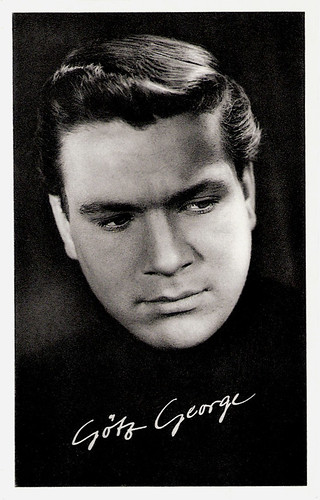
German postcard by Stöckel & Co., Hannover.

East-German postcard by VEB Progress Filmvertrieb, no. 2.002, 1964. Retail price: 0,20 DM.
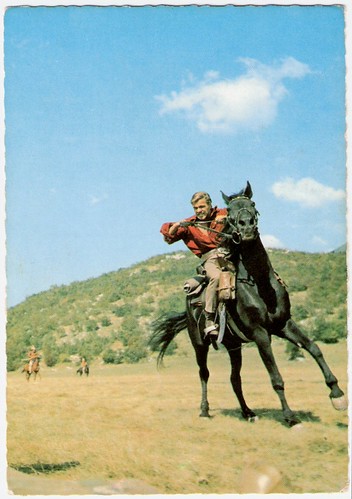
German postcard, no. ED 54. Photo: Constantin. Still from Der Schatz in Silbersee (Harald Reinl, 1962).
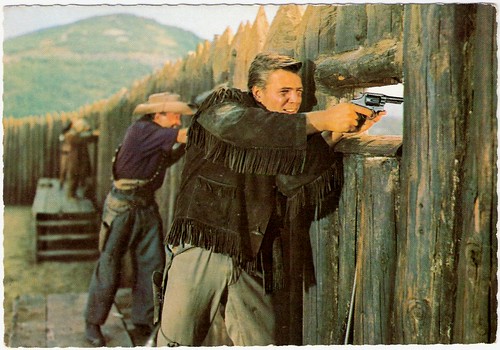
German postcard, no. E 58. Photo: Constantin. Still from Der Schatz im Silbersee (Harald Reinl, 1962).
After some supporting parts during the 1950s, Götz George broke through with film audiences and critics in the romance Jacqueline (Wolfgang Liebeneiner, 1959) with Johanna von Koczian. George was awarded the Bundesfilmpreis (the Gold Ribbon – a major German Film Award) for Best Newcomer and the Preis der Filmkritik (the German Critics Award).
Between 1959 and 1969 he appeared in 26 feature films. First, roles followed in Kirmes/The Fair (Wolfgang Staudte, 1960) playing a desperate Wehrmacht deserter, the thriller Die Fastnachtsbeichte/The Carnival Confession (William Dieterle, 1960), Der Teufel spielt Balaleika/Until Hell Is Frozen (Leopold Lahola, 1961), Mörderspiel/Murder Party (Helmut Ashley, 1961) with Magali Noël, Unser Haus in Kamerun/Our House in Cameroon (Alfred Vohrer, 1961) and the drama Das Mädchen und der Staatsanwalt/The Girl and the Prosecutor (Jürgen Goslar, 1962) with Elke Sommer.
He became well-known to a broad audience when, during his theatre tour in Göttingen, producer Horst Wendlandt persuaded him to play in a Karl May Western. The successful Der Schatz im Silbersee/Treasure of Silver Lake (Harald Reinl, 1962) was originally planned to give George the lead role of the farmer's son Fred Engel, but this plan was abandoned when Lex Barker was engaged to play the role of Old Shatterhand.
In 1962 George received the public Bambi Award as the most popular German actor. In the following years he often performed in comedies like Liebe will gelernt sein/Love Has To Be Learned (Kurt Hoffmann, 1963) and action-oriented films such as the war film Herrenpartie/Destination Death (Wolfgang Staudte, 1964) which benefitted from his physical presence.
George performed all the stunts himself like in his lead role as a sheriff in the Euro-western Sie nannten ihn Gringo/Man Called Gringo (Roy Rowland, 1965). Later he appeared in such films as the horror film The Blood of Fu Manchu (Jesus Franco, 1968) with Christopher Lee, and the war film Commandos (Armando Crispino, 1968) with Lee Van Cleef. He also appeared in the experiment Le vent d'est/East Wind (Groupe Dziga Vertov – a.o Jean Luc Godard, 1970) with Gian Maria Volonté. Filmportal.de: "Although he enjoyed great popularity, George always looked for new challenges as an actor."
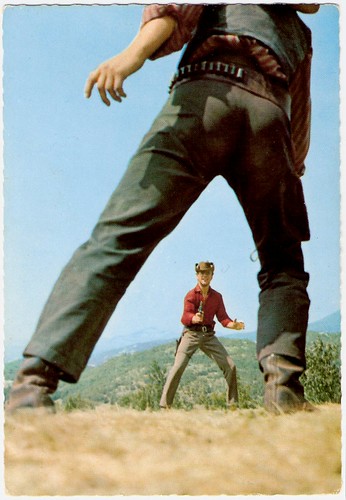
German postcard, no. E 61. Photo: Constantin. Still from Der Schatz im Silbersee (Harald Reinl, 1962).
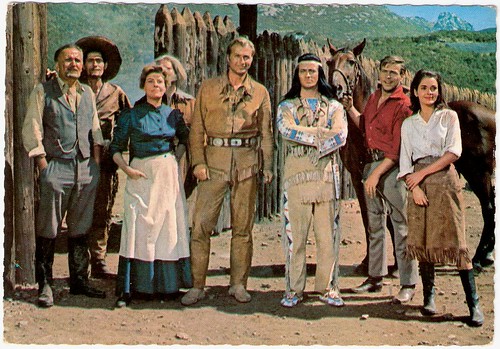
German postcard, no. ED 62. Photo: Constantin. Still from Der Schatz in Silbersee (Harald Reinl, 1962).
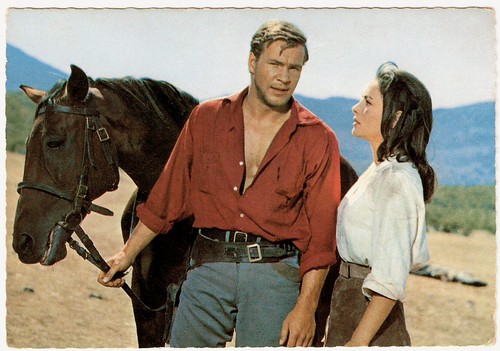
German postcard, no. ED 65. Photo: Constantin. Still from Der Schatz in Silbersee (Harald Reinl, 1962).
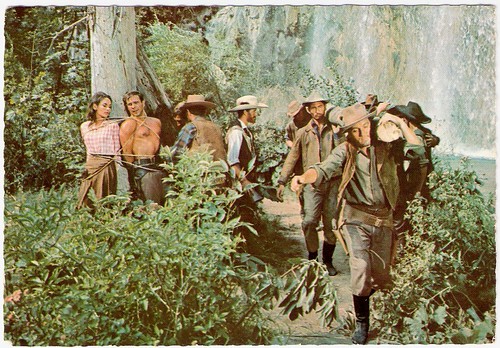
German postcard, no. E 76. Photo: Constantin. Still from Der Schatz im Silbersee (Harald Reinl, 1962).
In the 1970s, Götz George turned primarily to stage roles and to television, including many episodes of Krimis such as Der Komissar (1970-1973), Derrick (1978), and Der Alte/The Old Fox (1978-1979). Hansgünther Heyme signed him in 1972 to the Kölner Schauspielhaus, where George played Martin Luther in Dieter Forte's 'Martin Luther und Thomas Münzer'.
It was not until 1977 that he was cast in a prominent film role again. He gave a highly praised performance in Aus einem Deutschen Leben/Death Is My Trade (Theodor Kotulla, 1977) as Franz Lang, a character modelled after Auschwitz commander Rudolf Höss.
Notable stage appearances were in 'Troilus and Cressida', and in 'Endstation Sehnsucht' (A Streetcar Named Desire), as Stanley Kowalski. His most important stage achievement, in his own opinion, was the lead role in Georg Büchner's 'Dantons Tod' during the Salzburger Festspiele (Salzburg Festival) in 1981.
In 1986 and 1987 George stage-managed Gogol's 'Revisor', together with Eberhard Feik and Helmut Stauss. Performing in Anton Tschechow's 'Platonov' (1990), George went on his last theatre tour. He later admitted in an interview he feared the glances of the audience on stage.

German postcard by ISV, no. C 11. Photo: Constantin. Publicity still for Unter Geiern/Among Vultures (Alfred Vohrer, 1964) with Stewart Granger.

German postcard by ISV, no. C 13. Photo: Constantin. Publicity still for Unter Geiern/Among Vultures (1964, Alfred Vohrer) with Elke Sommer.
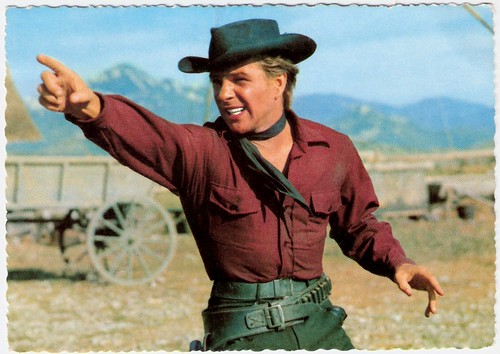
German postcard by ISV, no. C 16. Photo: Constantin. Publicity still for Unter Geiern/Among Vultures (Alfred Vohrer, 1964).

German postcard by ISV, no. C 20. Photo: Constantin. Publicity still for Unter Geiern/Among Vultures (Alfred Vohrer, 1964).
Götz George had his greatest popular success in the 1980s on television. In several Tatort TV films broadcast from 1981 to 1991 by the WDR, he portrayed police officer Horst Schimanski. This rough-hewed, working-class cop from Duisburg eventually became a cult figure.
Later, George kept returning to the role, playing Schimanski in 48 episodes of Tatort over 32 years. Aside from their success in Germany, the Schimanski films have introduced George to TV audiences worldwide: 427 million people have watched so far.
The series Schulz & Schulz (1989-1993), dealing with the issue of German reunification, allowed him to show his talents as a comedian in a double role, as did the role of an industry consultant in the series Morlock (1993-1994), which was very far away from the roughneck charm of Schimanski.
The films Abwärts/Out of Order (Carl Schenkel, 1984) with Renee Soutendijk, and Zahn um Zahn/A Tooth for a Tooth (Hajo Gies, 1985) which was based on the TV series Tatort, were both successful at the box office and among critics. In 1985, George received the Charlie-Chaplin-Schuh (German Cinema Award) and the Bundesfilmpreis (Gold Ribbon) as Best German Film Actor.
After starring in another Schimanski-adaption for the cinema, Zabou/The Crack Connection (Hajo Gies, 1987) and the action thriller Die Katze/The Cat (Dominik Graf, 1988) opposite Gudrun Landgrebe, George appeared in the film Der Bruch/The Breach (Frank Beyer, 1988), the first East-West-German co-production. The location of his next film was Argentina, where he starred in Blauäugig/Blue-Eyed (Reinhard Hauff, 1989).

German postcard, no. 15 (1-64). Photo: Constantin. Publicity still for Unter Geiern/Among Vultures (Alfred Vohrer, 1964) with Götz George (left) and Miha Baloh (right). Caption: It does not escape Annie's eyes, that the officer hands a note to the 'preacher'. Old Surehand recognises a vulture member in him. In the resulting fight, the fake soldier is killed, but the preacher can escape unnoticed.

German postcard, no. 24 (of 64). Photo: Constantin. Götz George as Martin in Unter Geiern/Among Vultures (Alfred Vohrer, 1964). Caption: In the meantime, Martin has also reached the vulture's quarters. To gain their trust, he pretends to be a horse thief. Unfortunately, this ruse fails and he is overpowered by the vultures.

German postcard, no. 43. Photo: Constantin / Rialto. Publicity still for Unter Geiern/Among Vultures (Alfred Vohrer, 1964). Caption: All too glad, the vultures are ready to hang Martin (Götz George).
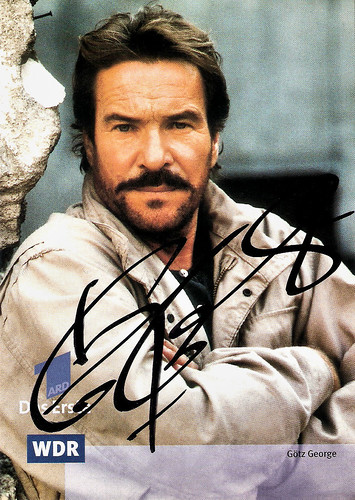
German postcard by WDR (Westdeutscher Rundfunk, Köln). Photo: WDR / Michael Böhme. Publicity still for Tatort (1981-1991).
In 1991, Götz George played a lead role in the social satire Schtonk (Helmut Dietl, 1991) about the forged Hitler diaries. It was a big success in Germany among audiences and critics, and the official German nomination for the Oscar. For this performance, George again received the Bundesfilmpreis (Gold Ribbon) as Best Actor. An impressive role was his TV appearance in Der Sandmann/The Sandman (Nico Hofmann, 1995) in which he portrayed the alleged serial killer and writer Henry Kupfer as a cold, calculating and manipulative intellectual. Another remarkable TV performance was the title role in Die Bubi-Scholz-Story/The Bubi Scholz Story (Roland Suso Richter, 1997), the trauma of an aged, broken boxer.
Always seeking great diversity in his choices and not afraid of taking risks, he played the serial killer Fritz Haarmann in Der Totmacher/Deathmaker (Romuald Karmakar, 1995). For this film he received the Coppa Volpi, the actor's award of the Venice Film Festival in 1995 and, once more, the Bundesfilmpreis (Gold Ribbon) in 1996. In the same year, he again appeared in another highly successful comedy Rossini (Helmut Dietl, 1996) with Mario Adorf.
George then starred in the gay comedy Das Trio/The Trio (Hermine Huntgeburth, 1997), and the thriller Solo für Klarinette/Solo for Clarinet (Nico Hofmann, 1998), a film adaption of the successful novel by Elsa Lewin. Next Götz George starred as Nazi Doctor Dr. Josef Mengele - the 'Death Angel of Auschwitz', who killed more than 300.000 people, in Nichts als die Wahrheit/After the Truth (Roland Suso Richter, 1999). In 2000 he played the advertiser Eddie Kaminski in Viktor Vogel - Commercial Man/Advertising Rules! (Lars Kraume, 2001), he was the strange bird Heinrich in the drama Gott ist tot/God is Dead (Kadir Sözen, 2003) and designer Jost in Maria an Callas/Maria on Callas (Petra K. Wagner, 2005).
After a six-year-intermission, Götz George returned to German TV screens as Schimanski in 1997. Schimanski and George's other roles in numerous successful TV features have made him the most well-known and most decorated German actor of his time. In 2002 Götz George played one of the leads in the TV film Mein Vater/Coming Home (Andreas Kleinert, 2002) which won the Emmy Award for Best Foreign Feature Film in 2003. The Schimanski episodes Das Geheimnis des Golem/The Secret of the Golem (2004) and Asyl/Asylum (2002) were nominated for the Emmy in 2004.
In 2007, Götz George received the Founders' Honorary Award of the German Television Award for his career achievement as an actor. In 2013, he starred in a very personal project: the biopic George (Joachim Lang, 2013). In this TV film, he portrayed his father, Heinrich George, whose legacy is overshadowed by his appearance in Nazi propaganda films. In 2014 George was awarded the Bundesverdienstkreuz, Germany's Federal Cross of Merit. Götz George was married to Loni von Friedl from 1966 to 1976. She gave birth to their daughter Tanja-Nicole in 1967. From 1997 he lived together with Hamburg journalist Marika Ullrich. The couple married in 2014. After a short illness, George died in Hamburg in 2016, but his death was kept secret until he was buried.
Trailer for Unter Geiern/Among Vultures (1964). Source: RialtoFilm (YouTube).
German trailer for Wartezimmer zum Jenseits (1964). Source: RialtoFilm (YouTube).
German trailer for Abwärts/Out of Order (1984). Source: disc-planet.ch (YouTube).
German trailer for Das Trio/The Trio (1997). Source: Salzgeber (YouTube).
Sources: Scott Roxborough (The Hollywood Reporter), Filmportal, Wikipedia, and IMDb.
This post was last updated on 12 May 2024.

Promotion card for 'Pioneer, Die jeans mit der nummer'.

East-German postcard by VEB Progress Filmvertrieb, no. 23/6/3264, 1957. Retail price: 0,20 DM. Photo: DEFA / Wenzel. Publicity still for Alter Kahn und Junge Liebe/Old Barge, Young Love (Hans Heinrich, 1957).

German postcard by Rüdel Verlag, no. C 16. Photo: Rialto / Constantin / Vogelmann. Still for Der Schatz im Silbersee/The Treasure of Silver Lake (Harald Reinl, 1962).

German collectors card. Photo: Constantin / Rialto. Publicity still for Unter Geiern/Among Vultures (Alfred Vohrer, 1964).
Ufa-Nachwuchsstudio
Götz George was born as Götz Schulz into an actor family in Berlin in 1938. His father Heinrich George was a famous film and theatre star of his era. His mother Berta Drews was a well-known character actress. George was named after his father's favourite character, the Imperial knight Götz von Berlichingen, immortalised by Goethe. After the war, his father was imprisoned in the former Concentration Camp Sachsenhausen by the Soviets and died, exhausted and starving, in 1946, after a botched appendix operation at the Soviet concentration camp Speziallager Nr. 7 Sachsenhausen.
George grew up in Berlin with his elder brother Jan and his mother. He went to school in Berlin-Lichterfelde and later attended the Lyzeum Alpinum in Zuoz. In 1950 George made his stage debut at the Hebbel-Theater in Berlin, performing a role in William Saroyan's 'Mein Herz ist im Hochland'.
In 1953 he was able to get a small film role next to Romy Schneider in Wenn der weiße Flieder wieder blüht/When the White Lilacs Bloom Again (Hans Deppe, 1953). In the same year, he played, as he would often do from then on, next to his mother in William Shakespeare's 'Richard III' on stage.
From 1955 to 1958 he studied at the Berlin Ufa-Nachwuchsstudio (the Ufa drama school). During that period, he starred in the DEFA comedy Alter Kahn und Junge Liebe/Old Barge, Young Love (Hans Heinrich, 1957).
The crucial part of his acting education, he received between 1958 and 1963. Following his mother's advice he occasionally played at the Deutsches Theater in Göttingen under the direction of Heinz Hilpert. After Hilpert's death, George would never join a fixed theatre company again, although he did regularly perform on tours and as a guest performer.

German postcard by Stöckel & Co., Hannover.

East-German postcard by VEB Progress Filmvertrieb, no. 2.002, 1964. Retail price: 0,20 DM.

German postcard, no. ED 54. Photo: Constantin. Still from Der Schatz in Silbersee (Harald Reinl, 1962).

German postcard, no. E 58. Photo: Constantin. Still from Der Schatz im Silbersee (Harald Reinl, 1962).
Karl May Westerns
After some supporting parts during the 1950s, Götz George broke through with film audiences and critics in the romance Jacqueline (Wolfgang Liebeneiner, 1959) with Johanna von Koczian. George was awarded the Bundesfilmpreis (the Gold Ribbon – a major German Film Award) for Best Newcomer and the Preis der Filmkritik (the German Critics Award).
Between 1959 and 1969 he appeared in 26 feature films. First, roles followed in Kirmes/The Fair (Wolfgang Staudte, 1960) playing a desperate Wehrmacht deserter, the thriller Die Fastnachtsbeichte/The Carnival Confession (William Dieterle, 1960), Der Teufel spielt Balaleika/Until Hell Is Frozen (Leopold Lahola, 1961), Mörderspiel/Murder Party (Helmut Ashley, 1961) with Magali Noël, Unser Haus in Kamerun/Our House in Cameroon (Alfred Vohrer, 1961) and the drama Das Mädchen und der Staatsanwalt/The Girl and the Prosecutor (Jürgen Goslar, 1962) with Elke Sommer.
He became well-known to a broad audience when, during his theatre tour in Göttingen, producer Horst Wendlandt persuaded him to play in a Karl May Western. The successful Der Schatz im Silbersee/Treasure of Silver Lake (Harald Reinl, 1962) was originally planned to give George the lead role of the farmer's son Fred Engel, but this plan was abandoned when Lex Barker was engaged to play the role of Old Shatterhand.
In 1962 George received the public Bambi Award as the most popular German actor. In the following years he often performed in comedies like Liebe will gelernt sein/Love Has To Be Learned (Kurt Hoffmann, 1963) and action-oriented films such as the war film Herrenpartie/Destination Death (Wolfgang Staudte, 1964) which benefitted from his physical presence.
George performed all the stunts himself like in his lead role as a sheriff in the Euro-western Sie nannten ihn Gringo/Man Called Gringo (Roy Rowland, 1965). Later he appeared in such films as the horror film The Blood of Fu Manchu (Jesus Franco, 1968) with Christopher Lee, and the war film Commandos (Armando Crispino, 1968) with Lee Van Cleef. He also appeared in the experiment Le vent d'est/East Wind (Groupe Dziga Vertov – a.o Jean Luc Godard, 1970) with Gian Maria Volonté. Filmportal.de: "Although he enjoyed great popularity, George always looked for new challenges as an actor."

German postcard, no. E 61. Photo: Constantin. Still from Der Schatz im Silbersee (Harald Reinl, 1962).

German postcard, no. ED 62. Photo: Constantin. Still from Der Schatz in Silbersee (Harald Reinl, 1962).

German postcard, no. ED 65. Photo: Constantin. Still from Der Schatz in Silbersee (Harald Reinl, 1962).

German postcard, no. E 76. Photo: Constantin. Still from Der Schatz im Silbersee (Harald Reinl, 1962).
Auschwitz commander
In the 1970s, Götz George turned primarily to stage roles and to television, including many episodes of Krimis such as Der Komissar (1970-1973), Derrick (1978), and Der Alte/The Old Fox (1978-1979). Hansgünther Heyme signed him in 1972 to the Kölner Schauspielhaus, where George played Martin Luther in Dieter Forte's 'Martin Luther und Thomas Münzer'.
It was not until 1977 that he was cast in a prominent film role again. He gave a highly praised performance in Aus einem Deutschen Leben/Death Is My Trade (Theodor Kotulla, 1977) as Franz Lang, a character modelled after Auschwitz commander Rudolf Höss.
Notable stage appearances were in 'Troilus and Cressida', and in 'Endstation Sehnsucht' (A Streetcar Named Desire), as Stanley Kowalski. His most important stage achievement, in his own opinion, was the lead role in Georg Büchner's 'Dantons Tod' during the Salzburger Festspiele (Salzburg Festival) in 1981.
In 1986 and 1987 George stage-managed Gogol's 'Revisor', together with Eberhard Feik and Helmut Stauss. Performing in Anton Tschechow's 'Platonov' (1990), George went on his last theatre tour. He later admitted in an interview he feared the glances of the audience on stage.

German postcard by ISV, no. C 11. Photo: Constantin. Publicity still for Unter Geiern/Among Vultures (Alfred Vohrer, 1964) with Stewart Granger.

German postcard by ISV, no. C 13. Photo: Constantin. Publicity still for Unter Geiern/Among Vultures (1964, Alfred Vohrer) with Elke Sommer.

German postcard by ISV, no. C 16. Photo: Constantin. Publicity still for Unter Geiern/Among Vultures (Alfred Vohrer, 1964).

German postcard by ISV, no. C 20. Photo: Constantin. Publicity still for Unter Geiern/Among Vultures (Alfred Vohrer, 1964).
Schimanski
Götz George had his greatest popular success in the 1980s on television. In several Tatort TV films broadcast from 1981 to 1991 by the WDR, he portrayed police officer Horst Schimanski. This rough-hewed, working-class cop from Duisburg eventually became a cult figure.
Later, George kept returning to the role, playing Schimanski in 48 episodes of Tatort over 32 years. Aside from their success in Germany, the Schimanski films have introduced George to TV audiences worldwide: 427 million people have watched so far.
The series Schulz & Schulz (1989-1993), dealing with the issue of German reunification, allowed him to show his talents as a comedian in a double role, as did the role of an industry consultant in the series Morlock (1993-1994), which was very far away from the roughneck charm of Schimanski.
The films Abwärts/Out of Order (Carl Schenkel, 1984) with Renee Soutendijk, and Zahn um Zahn/A Tooth for a Tooth (Hajo Gies, 1985) which was based on the TV series Tatort, were both successful at the box office and among critics. In 1985, George received the Charlie-Chaplin-Schuh (German Cinema Award) and the Bundesfilmpreis (Gold Ribbon) as Best German Film Actor.
After starring in another Schimanski-adaption for the cinema, Zabou/The Crack Connection (Hajo Gies, 1987) and the action thriller Die Katze/The Cat (Dominik Graf, 1988) opposite Gudrun Landgrebe, George appeared in the film Der Bruch/The Breach (Frank Beyer, 1988), the first East-West-German co-production. The location of his next film was Argentina, where he starred in Blauäugig/Blue-Eyed (Reinhard Hauff, 1989).

German postcard, no. 15 (1-64). Photo: Constantin. Publicity still for Unter Geiern/Among Vultures (Alfred Vohrer, 1964) with Götz George (left) and Miha Baloh (right). Caption: It does not escape Annie's eyes, that the officer hands a note to the 'preacher'. Old Surehand recognises a vulture member in him. In the resulting fight, the fake soldier is killed, but the preacher can escape unnoticed.

German postcard, no. 24 (of 64). Photo: Constantin. Götz George as Martin in Unter Geiern/Among Vultures (Alfred Vohrer, 1964). Caption: In the meantime, Martin has also reached the vulture's quarters. To gain their trust, he pretends to be a horse thief. Unfortunately, this ruse fails and he is overpowered by the vultures.

German postcard, no. 43. Photo: Constantin / Rialto. Publicity still for Unter Geiern/Among Vultures (Alfred Vohrer, 1964). Caption: All too glad, the vultures are ready to hang Martin (Götz George).

German postcard by WDR (Westdeutscher Rundfunk, Köln). Photo: WDR / Michael Böhme. Publicity still for Tatort (1981-1991).
The Death Angel of Auschwitz
In 1991, Götz George played a lead role in the social satire Schtonk (Helmut Dietl, 1991) about the forged Hitler diaries. It was a big success in Germany among audiences and critics, and the official German nomination for the Oscar. For this performance, George again received the Bundesfilmpreis (Gold Ribbon) as Best Actor. An impressive role was his TV appearance in Der Sandmann/The Sandman (Nico Hofmann, 1995) in which he portrayed the alleged serial killer and writer Henry Kupfer as a cold, calculating and manipulative intellectual. Another remarkable TV performance was the title role in Die Bubi-Scholz-Story/The Bubi Scholz Story (Roland Suso Richter, 1997), the trauma of an aged, broken boxer.
Always seeking great diversity in his choices and not afraid of taking risks, he played the serial killer Fritz Haarmann in Der Totmacher/Deathmaker (Romuald Karmakar, 1995). For this film he received the Coppa Volpi, the actor's award of the Venice Film Festival in 1995 and, once more, the Bundesfilmpreis (Gold Ribbon) in 1996. In the same year, he again appeared in another highly successful comedy Rossini (Helmut Dietl, 1996) with Mario Adorf.
George then starred in the gay comedy Das Trio/The Trio (Hermine Huntgeburth, 1997), and the thriller Solo für Klarinette/Solo for Clarinet (Nico Hofmann, 1998), a film adaption of the successful novel by Elsa Lewin. Next Götz George starred as Nazi Doctor Dr. Josef Mengele - the 'Death Angel of Auschwitz', who killed more than 300.000 people, in Nichts als die Wahrheit/After the Truth (Roland Suso Richter, 1999). In 2000 he played the advertiser Eddie Kaminski in Viktor Vogel - Commercial Man/Advertising Rules! (Lars Kraume, 2001), he was the strange bird Heinrich in the drama Gott ist tot/God is Dead (Kadir Sözen, 2003) and designer Jost in Maria an Callas/Maria on Callas (Petra K. Wagner, 2005).
After a six-year-intermission, Götz George returned to German TV screens as Schimanski in 1997. Schimanski and George's other roles in numerous successful TV features have made him the most well-known and most decorated German actor of his time. In 2002 Götz George played one of the leads in the TV film Mein Vater/Coming Home (Andreas Kleinert, 2002) which won the Emmy Award for Best Foreign Feature Film in 2003. The Schimanski episodes Das Geheimnis des Golem/The Secret of the Golem (2004) and Asyl/Asylum (2002) were nominated for the Emmy in 2004.
In 2007, Götz George received the Founders' Honorary Award of the German Television Award for his career achievement as an actor. In 2013, he starred in a very personal project: the biopic George (Joachim Lang, 2013). In this TV film, he portrayed his father, Heinrich George, whose legacy is overshadowed by his appearance in Nazi propaganda films. In 2014 George was awarded the Bundesverdienstkreuz, Germany's Federal Cross of Merit. Götz George was married to Loni von Friedl from 1966 to 1976. She gave birth to their daughter Tanja-Nicole in 1967. From 1997 he lived together with Hamburg journalist Marika Ullrich. The couple married in 2014. After a short illness, George died in Hamburg in 2016, but his death was kept secret until he was buried.
Trailer for Unter Geiern/Among Vultures (1964). Source: RialtoFilm (YouTube).
German trailer for Wartezimmer zum Jenseits (1964). Source: RialtoFilm (YouTube).
German trailer for Abwärts/Out of Order (1984). Source: disc-planet.ch (YouTube).
German trailer for Das Trio/The Trio (1997). Source: Salzgeber (YouTube).
Sources: Scott Roxborough (The Hollywood Reporter), Filmportal, Wikipedia, and IMDb.
This post was last updated on 12 May 2024.
1 comment:
Post a Comment